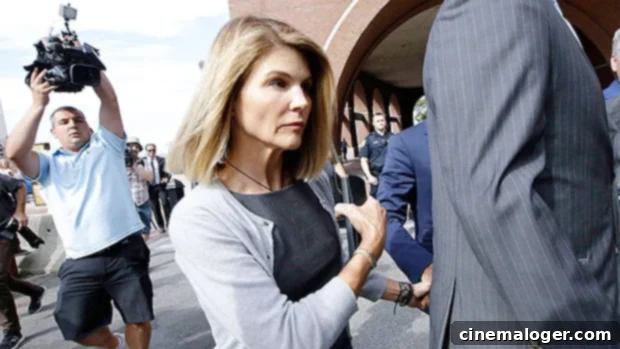Lori Loughlin’s Plea Deal: Navigating the Aftermath of the College Admissions Scandal
After a grueling 14-month legal battle that captivated headlines and sent shockwaves through Hollywood, actress Lori Loughlin and her husband, Mossimo Giannulli, have officially accepted plea deals in the infamous Operation Varsity Blues college admissions scandal. The decision, announced on May 21, 2020, brings a significant turning point in an ordeal that has exacted an immense emotional and physical toll on the couple and their two daughters, Olivia Jade, 20, and Isabella, 21. With prison time now on the horizon, the family is intensely focused on putting this harrowing experience behind them and beginning the arduous process of rebuilding their lives.
The journey from their March 2019 arrests to the recent plea agreement has been fraught with tension and public scrutiny. Initially facing charges of conspiracy to commit mail fraud and money laundering, Lori, 55, and Mossimo, 56, maintained their innocence for over a year, believing they were victims of a complex deception orchestrated by the scandal’s mastermind, Rick Singer. A source close to the couple exclusively shared with HollywoodLife.com, “Lori and Mossimo got taken in by a con man, Rick Singer, and trusted him because many of their close friends had used him to help provide college counseling guidance to their children. His non-profit foundation was a 501c3 and sanctioned by the U.S. government as a charitable organization. They had no idea what they were doing was a felony! U.S.C. [University of Southern California] actually cashed their check as well.” This perspective highlights their initial claim of misunderstanding the true criminal nature of Singer’s scheme, believing they were making legitimate donations to a charitable cause that would benefit the university and their children’s prospects.
Operation Varsity Blues, as the nationwide federal investigation was dubbed, uncovered a vast network of wealthy parents who conspired with William “Rick” Singer to secure their children’s admission to elite universities through bribery and fraud. Singer, who ran a college counseling service called “The Key,” facilitated two main types of schemes. The first involved bribing college athletic coaches to designate applicants as recruited athletes, regardless of their athletic ability, thereby significantly increasing their chances of admission. The second method entailed rigging standardized test scores, such as the SAT and ACT, by having individuals take the tests for students or by altering their answers after they had taken them. These illegal activities were often disguised as donations to Singer’s purportedly charitable Key Worldwide Foundation, which served as a conduit for the illicit payments.

Rick Singer himself pleaded guilty on March 12, 2019, to a litany of charges including money laundering, racketeering, obstruction of justice, and tax evasion. His confession laid bare the mechanics of his illicit enterprise, confirming that his Key Worldwide Foundation was instrumental in paying off SAT exam proctors to alter test scores and bribing coaches to secure spots for the children of affluent parents at prestigious institutions. Following Singer’s plea, Lori and Mossimo were among the high-profile individuals arrested, accused of allegedly paying him a substantial sum of $500,000. This payment was intended to facilitate the admission of their two daughters, Olivia Jade and Isabella, into the University of Southern California (U.S.C.) as crew recruits, despite the stark reality that neither girl had ever competitively participated in the sport.
The decision to eventually accept a plea deal came after more than a year of legal maneuvers, public scrutiny, and the looming threat of a lengthy prison sentence if found guilty at trial. The couple’s initial strategy of fighting the charges proved unsustainable, not only due to mounting legal fees and the relentless emotional strain but also the significant risk of facing far harsher penalties. As the insider confirmed, “They deeply regret what they did and want to put this experience behind them. It has taken a huge emotional and physical toll and both of them and their daughters.” The prospect of a prolonged, high-stakes trial, with its accompanying media circus, likely played a crucial role in their decision to seek a resolution through negotiation.
On May 21, the Justice Department formally announced that Lori Loughlin and Mossimo Giannulli had reached an agreement to plead guilty in the college admissions bribery case. Subject to the court’s ultimate approval, the terms of their plea deals were meticulously outlined. The former Full House star, Lori, agreed to serve two months in federal prison, pay a $150,000 fine, complete two years of supervised release, and perform 100 hours of community service. Her husband, the renowned fashion designer Mossimo, agreed to a more stringent sentence, including five months in federal prison, a $250,000 fine, two years of supervised release, and 250 hours of community service. These penalties, while significant, represent a stark contrast to the potential maximum sentence Lori could have faced – up to 50 years behind bars – had she gone to trial and been found guilty on all initial charges of conspiracy to commit mail and wire fraud and honest services mail and wire fraud, and conspiracy to commit money laundering.
The forthcoming federal prison sentences mean that the Giannulli family will soon be physically separated, at least temporarily. This impending separation adds another layer of emotional complexity to an already challenging period. For their daughters, Olivia Jade and Isabella, the scandal has had profound and far-reaching consequences. Olivia Jade, a prominent YouTube personality and influencer, saw her burgeoning career collapse almost overnight. She lost lucrative endorsement deals with major brands and temporarily stepped away from her social media platforms as public backlash intensified. Both daughters have had to navigate intense public scrutiny, personal embarrassment, and the strain of seeing their parents embroiled in a high-profile criminal case. The emotional impact on young adults, whose college admissions became a national news story, is immeasurable and will undoubtedly be a factor in their personal and professional lives for years to come.
The Loughlin-Giannulli case has resonated widely, largely due to Lori Loughlin’s status as a beloved public figure, known for her wholesome roles. Her involvement in a scandal centered on privilege and alleged corruption in higher education struck a particular chord with the public, sparking debates about wealth, access, and fairness in the American education system. The public reaction underscored a broader frustration with perceived advantages of the affluent, and how such advantages can sometimes morph into illegal acts. For Lori, transitioning from a celebrated actress to a federal defendant has been a dramatic and undoubtedly humbling experience, forever altering her public image and career trajectory. The public perception shifted from adoration to disappointment and, for some, outrage, creating a challenging environment for her and her family to navigate.
Looking ahead, Lori and Mossimo are scheduled to be formally sentenced in a Boston federal court on August 21, 2020. This sentencing will formalize the terms of their plea deals, making their prison terms and other penalties official. While the plea deal offers a definitive end to the legal uncertainty, it marks the beginning of a new chapter filled with personal challenges, including serving time, fulfilling community service, and living under supervised release. The couple’s primary desire now is to complete their sentences and move forward with their lives, seeking a return to some semblance of normalcy and privacy for their family. This ordeal serves as a stark reminder of the serious legal ramifications that can arise from attempting to circumvent established systems, regardless of perceived intentions or the involvement of others. The focus for the family remains on healing, introspection, and navigating the path to rehabilitation and regaining trust, both within their personal circle and, perhaps eventually, with the public.
